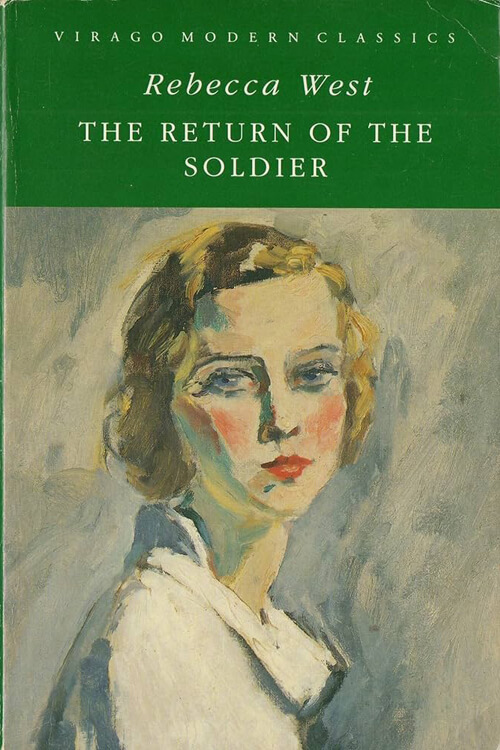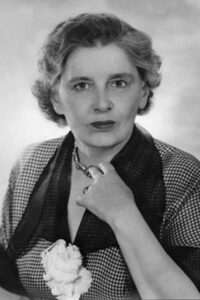
The Return of the Soldier
“AH, don’t begin to fuss!” wailed Kitty. “If a woman began to worry in these days because her husband hadn’t written to her for a fortnight! Besides, if he‘d been anywhere interesting, anywhere where the fighting was hot, he‘d have found some way of telling me instead of just leaving it as ‘Somewhere in France.’ He’ll be all right.”
We were sitting in the nursery. I had not meant to enter it again, now that the child was dead; but I had come suddenly on Kitty as she slipped the key into the look, and I had lingered to look in at the high room, so full of whiteness and clear colors, so unendurably gay and familiar, which is kept in all respects as though there were still a child in the house. It was the first lavish day of spring, and the sunlight was pouring through the tall, arched windows and the flowered curtains so brightly that in the old days, a fat fist would certainly have been raised to point out the new, translucent glories of the rosebud. Sunlight was lying in great pools on the blue cork floor and the soft rugs, patterned with strange beasts and threw dancing beams, which should have been gravely watched for hours, on the white paint and the blue distempered walls. It fell on the rocking horse, which had been Chris’s idea of an appropriate present for his year-old son, and showed what a fine fellow he was and how tremendously dappled; it picked out Mary and her little lamb on the chintz ottoman. And along the mantelpiece, under the loved print of the snarling tiger, in attitudes that were at once angular and relaxed, as though they were ready for play at their master’s pleasure, but found it hard to keep from drowsing in this warm weather, sat the Teddy Bear and the chimpanzee and the woolly white dog and the black cat with eyes that roll. Everything was there except Oliver. I turned away so that I might not spy on Kitty revisiting her dead. But she called after me:
“Come here, Jenny. I’m going to dry my hair.” And when I looked again I saw that her golden hair was all about her shoulders and that she wore over her frock a little silken jacket trimmed with rosebuds. She looked so like a girl on a magazine cover that one expected to find a large “15 cents” somewhere attached to her person. She had taken Nanny’s big basket chair from its place by the high chair and was pushing it over to the middle window. “I always come in here when Emery has washed my hair. It’s the sunniest room in the house.
Read or download Book
Rebecca West
Dame Cicily Isabel Fairfield DBE (21 December 1892 – 15 March 1983), known as Rebecca West, or Dame Rebecca West, was a British author, journalist, literary critic, and travel writer. An author who wrote in many genres, West reviewed books for The Times, the New York Herald Tribune, The Sunday Telegraph, and The New Republic, and she was a correspondent for The Bookman. Her major works include Black Lamb and Grey Falcon (1941), on the history and culture of Yugoslavia; A Train of Powder (1955), her coverage of the Nuremberg trials, published originally in The New Yorker; The Meaning of Treason (first published as a magazine article in 1945 and then expanded to the book in 1947), later The New Meaning of Treason (1964), a study of the trial of the British fascist William Joyce and others; The Return of the Soldier (1918), a modernist World War I novel; and the “Aubrey trilogy” of autobiographical novels, The Fountain Overflows (1956), This Real Night (published posthumously in 1984), and Cousin Rosamund (1985). Time called her “indisputably the world’s number one woman writer” in 1947. She was made CBE in 1949, and DBE in 1959 in each case, the citation reads: “writer and literary critic”. She took the pseudonym “Rebecca West” from the rebellious young heroine in Rosmersholm by Henrik Ibsen. She was a recipient of the Benson Medal.
Biography
Rebecca West was born Cicily Isabel Fairfield in 1892 in London, England, and grew up in a home full of intellectual stimulation, political debate, lively company, books, and music. Her mother, Isabella, a Scotswoman, was an accomplished pianist but did not pursue a musical career after her marriage to Charles Fairfield. The Anglo-Irish Charles had been a Confederate stretcher-bearer at the siege of Richmond in the US Civil War and had returned to the UK to become a journalist of considerable reputation but financial incompetence. He deserted his family when Cicily was eight years old. He never rejoined them, and died impoverished and alone in a boarding house in Liverpool in 1906, when Cicily was 14. The rest of the family moved to Edinburgh, Scotland, where Cicily was educated at George Watson’s Ladies College. She had to leave school in 1907 due to a bout of tuberculosis. She chose not to return after recovering from the illness, later describing her schooling at Watson’s as akin to a “prison”.
West had two older sisters. Letitia (“Lettie”), who was the best educated of the three, became one of the first fully qualified female doctors in Britain, as well as a barrister at the Inns of Court. Winifred (“Winnie”), the middle sister, married Norman Macleod, Principal Assistant Secretary in the Admiralty, and eventually director general of Greenwich Hospital. Winnie’s two children, Alison and Norman, became closely involved in Rebecca’s life as she got older Alison Macleod would achieve a literary career of her own. West trained as an actress in London, taking the name “Rebecca West” from the rebellious young heroine in Rosmersholm by Henrik Ibsen. She and Lettie became involved in the women’s suffrage movement, participating in street protests. Meanwhile, West worked as a journalist for the feminist weekly Freewoman and the Clarion, drumming up support for the suffragette cause.






